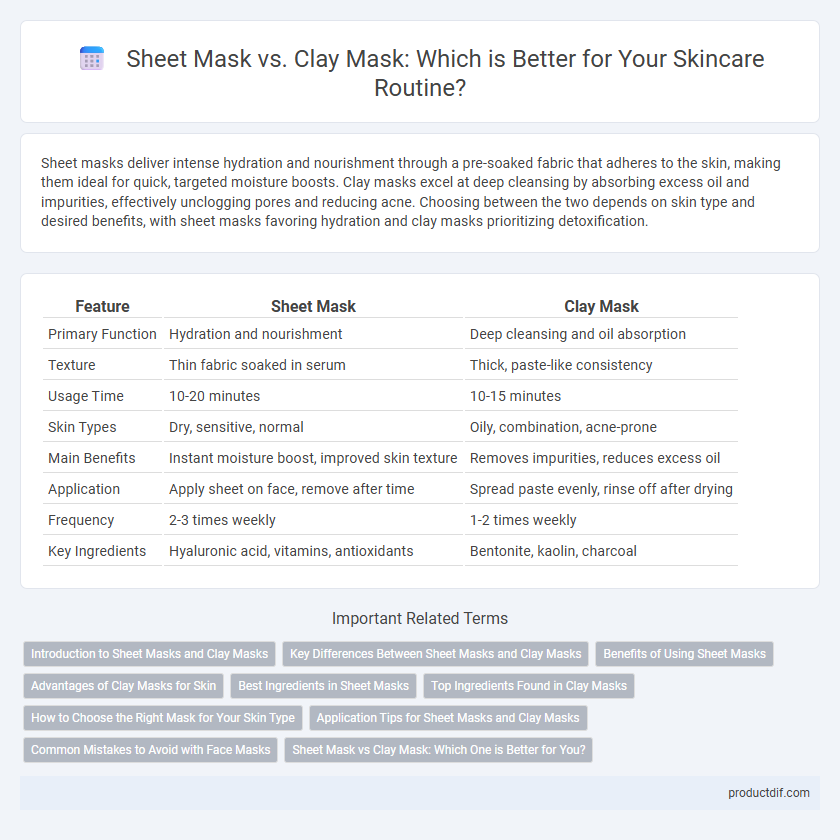Sheet masks deliver intense hydration and nourishment through a pre-soaked fabric that adheres to the skin, making them ideal for quick, targeted moisture boosts. Clay masks excel at deep cleansing by absorbing excess oil and impurities, effectively unclogging pores and reducing acne. Choosing between the two depends on skin type and desired benefits, with sheet masks favoring hydration and clay masks prioritizing detoxification.
Table of Comparison
| Feature | Sheet Mask | Clay Mask |
|---|---|---|
| Primary Function | Hydration and nourishment | Deep cleansing and oil absorption |
| Texture | Thin fabric soaked in serum | Thick, paste-like consistency |
| Usage Time | 10-20 minutes | 10-15 minutes |
| Skin Types | Dry, sensitive, normal | Oily, combination, acne-prone |
| Main Benefits | Instant moisture boost, improved skin texture | Removes impurities, reduces excess oil |
| Application | Apply sheet on face, remove after time | Spread paste evenly, rinse off after drying |
| Frequency | 2-3 times weekly | 1-2 times weekly |
| Key Ingredients | Hyaluronic acid, vitamins, antioxidants | Bentonite, kaolin, charcoal |
Introduction to Sheet Masks and Clay Masks
Sheet masks are single-use skincare products infused with serum, designed to deliver concentrated hydration and nutrients directly to the skin, making them ideal for instant moisture and brightening effects. Clay masks use natural clays like kaolin or bentonite to absorb excess oil, detoxify pores, and promote deep cleansing, perfect for oily or acne-prone skin types. Both mask types target different skincare needs: sheet masks prioritize hydration and soothing, while clay masks focus on purification and oil control.
Key Differences Between Sheet Masks and Clay Masks
Sheet masks provide intense hydration and deliver concentrated active ingredients through a soaked fabric layer that adheres to the skin, making them ideal for moisturizing and brightening. Clay masks excel at detoxifying, absorbing excess oil, and purifying pores by drawing out impurities with natural mineral-rich clays like bentonite or kaolin. The choice between sheet masks and clay masks depends on skin type and desired benefits, with sheet masks being suitable for dry or sensitive skin and clay masks better suited for oily or acne-prone skin.
Benefits of Using Sheet Masks
Sheet masks deliver intense hydration and nutrient absorption by creating a sealed environment that enhances skin penetration of active ingredients. Their lightweight, breathable fabric ensures even distribution of serums, promoting a radiant and plump complexion with minimal irritation. Ideal for sensitive and dehydrated skin, sheet masks provide a quick, convenient boost of vitamins, antioxidants, and moisturizing agents.
Advantages of Clay Masks for Skin
Clay masks offer superior oil absorption, making them ideal for controlling excess sebum and reducing acne breakouts. Rich in minerals like kaolin and bentonite, they detoxify pores and improve skin texture by drawing out impurities and reducing inflammation. Their mattifying effect leaves skin looking fresh and balanced, perfect for oily and combination skin types.
Best Ingredients in Sheet Masks
Sheet masks often feature hydrating ingredients such as hyaluronic acid, glycerin, and aloe vera that deeply moisturize the skin. Antioxidants like vitamin C and green tea extract are commonly included to brighten and protect against environmental damage. These carefully selected ingredients make sheet masks ideal for delivering targeted nourishment and enhancing skin radiance.
Top Ingredients Found in Clay Masks
Clay masks commonly feature key ingredients like kaolin and bentonite, which excel at absorbing excess oil and impurities from the skin. These minerals contain natural exfoliants that unclog pores and promote a clearer complexion. Enriched often with botanical extracts such as green tea or chamomile, clay masks provide soothing and anti-inflammatory benefits alongside deep cleansing properties.
How to Choose the Right Mask for Your Skin Type
Selecting the right mask depends on your skin type: sheet masks are ideal for hydration and soothing dry or sensitive skin due to their serum-rich formulas, while clay masks effectively absorb excess oil and impurities, making them suitable for oily and acne-prone skin. Understanding your skin's needs--such as hydration, oil control, or detoxification--guides the choice between the moisturizing benefits of sheet masks and the deep-cleansing effects of clay masks. For combination skin, alternating between both types can balance hydration and oil absorption without causing irritation.
Application Tips for Sheet Masks and Clay Masks
Sheet masks require a clean, dry face before application to maximize serum absorption, and they should be left on for 15-20 minutes to prevent drying out and irritation. Clay masks benefit from even application in a thin layer, avoiding sensitive areas like eyes and lips, and should be rinsed off after 10-15 minutes once partially dried but not completely hardened to maintain skin moisture. Both masks work best when followed by a moisturizer to seal in hydration and enhance skin benefits.
Common Mistakes to Avoid with Face Masks
Using sheet masks on oily skin without proper cleansing can trap impurities and worsen breakouts, while leaving clay masks on for too long can lead to excessive dryness and irritation. Applying masks too frequently, more than 3 times a week, disrupts the skin's natural barrier and causes sensitivity. Always follow product instructions, avoid overlapping masks, and patch-test new products to prevent adverse reactions.
Sheet Mask vs Clay Mask: Which One is Better for You?
Sheet masks provide intense hydration and are ideal for sensitive or dry skin types, delivering concentrated serums that brighten and soothe. Clay masks excel at detoxifying, absorbing excess oil, and unclogging pores, making them suitable for oily or acne-prone skin. Choosing between sheet masks and clay masks depends on your skin concerns, with sheet masks targeting moisture and clay masks focusing on deep cleansing and oil control.
Sheet Mask vs Clay Mask Infographic

 productdif.com
productdif.com